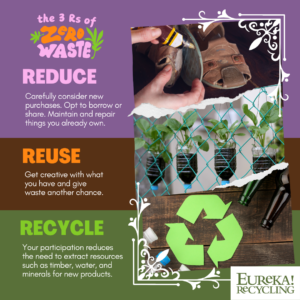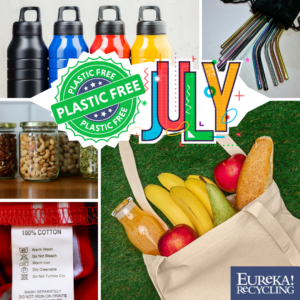“I cannot stress enough that we cannot recycle and compost our way out of the packaging crisis. We need a fundamental shift toward reduction and reuse systems,” Lucy Mullany, Eureka’s Director of Policy, testifying this week at the Committee on Environment, Climate, and Legacy in support of the Packaging Waste and Cost Reduction Act.
Watch Lucy’s testimony – and for a more detailed look at Eureka’s recommendations, please see our written testimony below.
Eureka’s Written Testimony
February 22, 2024
Minnesota Senate
Environment, Climate and Legacy Committee
Re: Packaging Waste & Cost Reduction Act (SF3561)
We are committed to improving recycling and reducing waste in Minnesota. We appreciate Representative Morrison’s work on the Packaging Waste & Cost Reduction Act. Our letter highlights major pieces of the bill that will improve recycling and advance waste reduction efforts in the state and sections of the legislation that need to be shored up to ensure it is meeting the aims of the program.
Eureka Recycling is a non-profit, social enterprise, recycler here in the Twin Cities. We are a proud union shop with union mechanics and drivers. Our team sorts 100,000 tons of residential recyclables each year into 15 different commodities that support our local supply chain. About
80% of our feedstock is turned into new products here in Minnesota and 90% in the greater Midwest. We work to demonstrate that recycling can and should be done in ways that benefit our environment, communities, and the regional economy.
Unfortunately, the growing packaging crisis is making this work increasingly difficult. Problematic and unnecessary packaging is trashing our recycling system, adding unnecessary costs to our communities, and polluting our environment. It’s time producers are held accountable for these impacts. The Packaging Waste and Cost Reduction Act aims to do this by requiring producers
pay for the cost to take back, recycle, or properly dispose of their products and packaging while driving towards reduction, reuse, and increased recycling and composting rates.
SF3561 takes the following key actions:
Supports Equitable Access to Recycling. While Minnesota has worked hard to develop strong recycling programs, only about 55% of households have automatic access to curbside services and our combined recycling and composting rate has remained somewhat stagnant at around 45%. Where curbside programs do not exist, many communities cannot afford to provide recycling drop-off centers and rural areas face significantly higher costs. This bill creates a sustainable funding system to support convenient, equitable recycling for all residents regardless of income, housing type, or demographics. The Producer Responsibility Organization (PRO) will be required to use member fees to ensure all residents have convenient, equitable, access to recycling.
Supports Higher Recycling Rates & Reduces Climate Pollution: The primary environmental and climate benefits of recycling occur when we use recycled materials to make new products and packaging, not just by keeping materials out of landfills and incinerators. Using recycled materials in new products directly displaces the use of virgin resources, and with that, the energy used and pollution caused by extracting and processing fossil fuels, timber, metals and other raw feedstocks is greatly reduced. The displacement of virgin resources through use of recycled content is where most of the environmental benefits of recycling occur, so driving greater use of recycled content is a primary motivation for collecting materials for recycling. The bill supports these efforts by driving redesign of packaging towards recyclability, creating strong criteria for what can be considered curbside recyclable, setting strong recycled content requirements, and increasing access to recycling programs.
Provides Stability to Commodity Markets: The bill includes strong minimum requirements for post consumer recycled content in materials sold into the state. While this is key for reducing reliance on virgin materials, it will also provide much needed stability to commodity markets. Recycled content requirements drive stronger recycling markets for MRFs and create the market demand for materials to go back into containers rather than into downcycled uses. Post-consumer recycled content standards appropriately place the onus of recycling on producers, rather than the recycling operators, since the companies make the decisions about where to source their feedstock and how to design their products.
Leverages Infrastructure & Supports Quality Jobs: The bill protects the open and fair bidding process that haulers across our state are currently accustomed to. It ensures that priority is given to service providers here in Minnesota that provide living wages and benefits, employ strong safety standards for their workers, and provide quality services. For recyclers, it also requires bale standards are met and materials are sent to responsible end markets.
Prioritizes Source Reduction: We cannot recycle or compost our way out of the packaging crisis, we need a fundamental shift towards reduction and reuse systems. The bill does not rely simply on eco-modulation to incentivize producers to reduce or move to reusable and refillable containers. It includes specific targets for source reduction, reuse, recycling, composting and recycled content over the next 10-15 years. The targets set in the bill are data driven and appropriate to build off of the successful progress we have made in Minnesota. The bill also offers a pathway for the agency to amend these targets based on the needs assessment. As we’ve noted below, the language in this section needs to be strengthened to ensure producers are held accountable to these targets.
Outstanding Issues that need to be addressed:
Director of Policy & Advocacy
Eureka Recycling
Share this Story!
Zero Waste Event in Mankato Draws 300+ Attendees
In September, we joined our Mankato partners for a celebration of waste reduction efforts. The Minnesota Zero Waste Coalition, Mankato

Trash the Overwhelm and Take Action to Reduce Waste
The United States, which represents just 4% of the global population, produces a whopping 12% of global municipal solid waste.
Minnesota Settles Lawsuit on Deceptive Recycling Labeling
Deceptive labeling impacts our operations daily at Eureka. Companies will often label something as recyclable causing it to end up

Beyond the July Challenge: Maintaining a Plastic-Free Lifestyle
While our plastic production and pollution crisis can feel very overwhelming, there are actions we can take that will make
